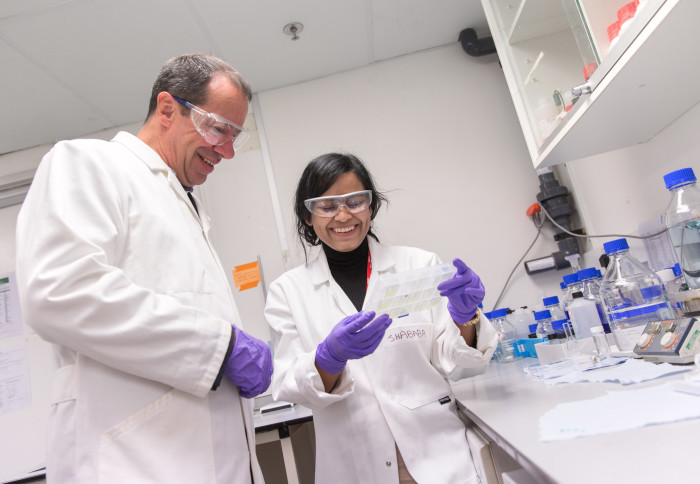Exploring the opportunities of solar fuels for a clean energy future

A team of researchers at Imperial have been part of an international collaboration exploring the opportunities of solar fuels
Imperial researchers are playing a leading role in the development of a global roadmap for solar fuels.
Solar energy is one of the cheapest and most sustainable energy sources, but it is expensive to store and is not always available when and where it is needed.
Scientists have been developing ways to use solar energy to create hydrogen, a carbon-neutral gas that can replace traditional ‘natural gas’ for use in home heating and some industrial processes, and can also be stored and transported in a similar way to natural gas.
A team of researchers at Imperial College London have been part of an international collaboration, called Mission Innovation, that is creating a roadmap, identifying how to promote solar-powered hydrogen fuels (‘solar fuels’) to the international community of governments, investors and private energy companies.
Now Imperial has been given the support of the UKRI Strategic Priorities Fund to drive forwards the completion of this roadmap as part of the UK’s preparation for COP26, as well as creating a review for policymakers of the contribution that solar fuels can make to halting climate change which addresses the scale of current technical challenges. The review is due to be published in 2021 in collaboration with the Grantham Institute – Climate Change and the Environment, one of the College’s Global Institutes.
Climate change is a burning issue
Burning fossil fuels including coal, oil and natural gas releases carbon emissions that collect in the atmosphere and warm the planet, causing our climate to change, and leading to heatwaves, wildfires and droughts.
The potential contribution of solar fuels to global decarbonisation efforts is exciting but challenging. Professor James Durrant Department of Chemistry
Sunlight conversion, or artificial photosynthesis, is a chemical process inspired by the natural process of photosynthesis whereby sunlight, water, and carbon dioxide are converted into carbohydrates and oxygen. In the artificial process, energy is captured from sunlight and stored as a fuel, potentially transforming sustainable energy options on a global scale. Solar generated hydrogen generates almost no carbon dioxide when produced, virtually eliminating emissions from fuel use.
The Mission Innovation Challenge on Converting Sunlight (IC5) has brought together governments, academics and the private sector through a global initiative to discover affordable ways to convert sunlight into storable solar fuels. IC5: Converting Sunlight Roadmap 2020-2050, developed in partnership with 25 other countries, sets out the opportunities for solar energy in mitigating climate change and enhancing energy security. Solar energy is one of the most sustainable energy sources on the planet and will be the largest single energy resource needed to limit global warming to 1.5°c according to the Special Report on Global Warming of 1.5 °C (SR15) which was published by the Intergovernmental Panel on Climate Change (IPCC) in 2018.
Professor James Durrant of the Department of Chemistry who is the UK lead for IC5 emphasised the ‘blue sky’ nature of solar fuels research. He said: “The potential contribution of solar fuels to global decarbonisation efforts is exciting but challenging. The development of a roadmap will help to provide a structure on which we can build the science and clarify to policymakers the potentially transformative role of solar fuel technologies as part of our pathway to net zero carbon emissions.”

Dr Sacha Corby, also of the Department of Chemistry has played a leading role in the development of the roadmap, acting as intermediary between EU Commissioners and formal IC5 leads. She added:
“A more coherent global strategy exploring the opportunities of solar energy will help to convince policymakers of the benefits of solar fuels innovation. The roadmap will set out how researchers in this emerging field can unite as a community to drive change and determine the milestones that need to be achieved in order to overcome the challenges of generating fuels from sunlight. Successful solar fuels innovation projects in Japan and the USA could be replicated in the UK, producing positive environmental and economic impact.”
The Imperial team, which also includes Dr Oytun Babacan from the Grantham Institute, hope that development of the roadmap will help to shape the second phase of Mission Innovation, building on the successes of the first phase in identifying emerging opportunities, which is due to be launched at COP26.
Tackling the challenges of solar fuels innovation
Alongside the development of the roadmap, the UKRI Strategic Priorities Funding has also provided an opportunity for a review into the technical challenges and mitigation potential of solar fuels. Co-authors Dr Babacan, Professor Jenny Nelson, Head of the Mitigation Team at the Grantham Institute and Mr Brian Tam, a Research Postgraduate in the Department of Physics, are comparing the resource requirements of different routes to generate hydrogen fuel from solar energy.
Energy input costs and material needs are important factors in determining the sustainability of any energy technology. These resource costs could present a major challenge to artificial photosynthesis becoming a widespread component of renewable energy options. In the course of developing the review, the team have discovered that the recycling of materials could be a key factor in the sustainability of solar fuels innovation. A separate study evaluating the impact of recycling of materials required to produce solar fuels has now been planned by the team.
The review builds on a recent study (Assessing the feasibility of carbon dioxide mitigation options in terms of energy usage) which was funded by the ESRC Impact Acceleration Account and published in Nature in July 2020.
Imperial’s Academic Strategy
The College’s Academic Strategy sets out a vision for Imperial as a place for authoritative thinking, world-leading teaching, and creative research ideas. We have identified four themes which bring together research, education and translation activity across our faculties over the next five years: sustainable society; healthy society; smart society; and resilient society. In line with the sustainable society example outlined above, UK Research and Innovation Strategic Priorities Funding is supporting our work across all four themes.
Article text (excluding photos or graphics) © Imperial College London.
Photos and graphics subject to third party copyright used with permission or © Imperial College London.
Reporter
Bridget McNulty
Division of the University Secretary